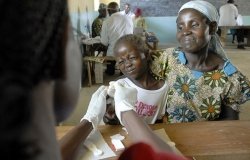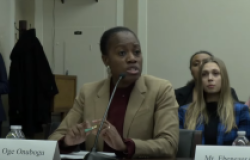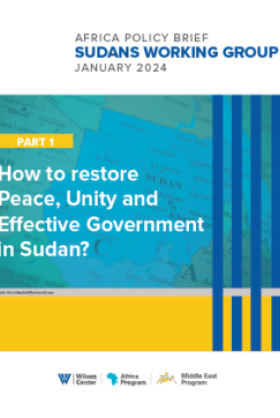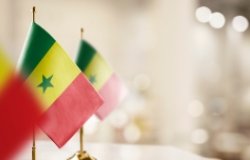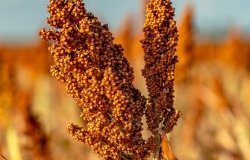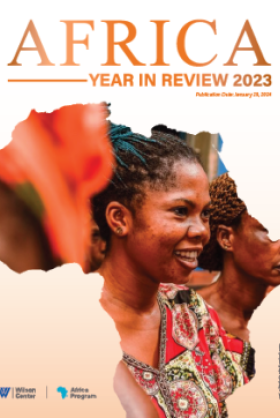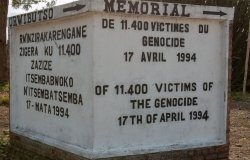Rwanda and the Great Lakes Region
A discussion with Michael Arietti, the U.S. Ambassador to Rwanda. Arietti provided a U.S. perspective on economic and political developments in Rwanda. He also discussed the role of Rwanda in the broader Great Lakes Region of Africa, as well as its evolving relationship with the U.S.
Overview
Rwanda and the Great Lakes Region
A discussion with Michael Arietti, the U.S. Ambassador to Rwanda.
On October 16, 2006, the Wilson Center's Africa Program hosted the U.S. Ambassador to Rwanda, Michael Arietti, to discuss Rwanda's economic and political evolution since the 1994 genocide and the country's involvement in the Africa Great Lakes region.
In his opening remarks, Ambassador Arietti advised the audience to avoid common stereotypes and extreme opinion about Rwanda, noting that the country is neither a miracle nor a failure.
According to Ambassador Arietti, everything in Rwanda is linked to the 1994 genocide during which somewhere between 800,000 and one million people were murdered in the course of ninety days. However, the country has been rebuilt and Kigali shows very few signs of the genocide and the civil war. At the individual level, the impacts are still very hard to measure as people are still not open about it and stories are only coming out slowly.
As far as Rwanda's relationship with its neighbors is concerned, Ambassador Arietti expressed satisfaction about its progress. According to him, the strained relationship of the past between Rwanda and the Democratic Republic of Congo (DRC) has given way, thanks to the active role of the US government, to a Tripartite Plus process that brings together policymakers and military personnel from Rwanda, the DRC, Uganda and Burundi at various levels to share information and intelligence. Today, there are no more Rwandan forces in Congo and the two countries have started to develop trade and commerce. Ambassador Arietti is hopeful that the elections in the DRC will consolidate this process, and enable the two countries to develop consensus of what is actually happening and to take common action.
Ambassador Arietti moved next to the Rwandan participation in the Darfur peacekeeping force. For him, this is very symbolic of the new Rwanda, a country which is making an outreach which he believes is motivated by the failure of the international community and the UN during the 1994 genocide.
Ambassador Arietti concluded his regional analysis by focusing on Rwanda's intention to join the East African Community (EAC). He sees it as a desire of the government of Rwanda to position the country to take advantage of its geographical and historical positions. Indeed, the country is not only bilingual but also is located in the middle of a very large growing African community to its east and a potential resurging Congo to its west. Even though this action will be expensive as the country will have to adjust to the norms of the EAC by lowering its taxes and therefore loosing revenues, many Rwandans see their future as being an integral part of East Africa.
Then, Ambassador Arietti turned to a discussion of Rwanda's internal situation since 1994. He focused on two main points: the state of Rwanda after the genocide and the reconstruction of the country. In the aftermath of the genocide, the foundations of the state were destroyed. More than 2/3 of the population was physically affected and the entire population was psychologically and emotionally traumatized. However, he noted that since these tragic events, the situation has significantly improved even though the desired level of national unity and reconciliation remain remote.
In 1996, 120,000 individuals who were involved in the atrocities were placed in jail. Faced with the monumental tasks of sending them to a collapsed judiciary system, Rwanda had to innovate and construct alternative schemes to have them judged. Aside from the several leaders of the genocide who have been tried in Arusha (Tanzania), the vast majority of these individuals are being tried through the gacaca process: a very complicated quasi judiciary system which starts at the community level in order to investigate what happened. The objective of the Rwandan authorities is to have the gacaca process completed by the end of 2007. Also, as Ambassador Arietti emphasized, despite the reconstruction and reorganization which have been taking place since 1994, the state continues to suffer from a lack of judicial and governance capacity. However, as opposed to many African countries, the authorities, especially the police, are honest and have won the confidence of the population. This point is critical in moving forward toward the broader goal of democratization and the emergence of checks and balances within the new government. Today, Rwanda is once again a very structured society.
Ambassador Arietti highlighted the progress made on the decentralization front in an attempt to get services delivered directly to the people. Concurrently, local authorities will be controlling development projects and officials' salaries, resulting in an increased efficiency in terms of economic development and the remittance of resources to the communities.
As far as the political situation is concerned, Ambassador Arietti said the RPF (Rwanda Patriotic Front) was dominant. The RPF is allied with small parties and collaborates with them in the parliament. He regretted that the country does not have a policy-oriented opposition party. He noted that many observers believe that there is no political space for freedom of association or for strong opposition political parties to emerge. However, he argued that it is a simplification to label the country a "one party state". Indeed, the fundamental focus is to prevent the past use of ethnicity as the principal unifying force in society. Today, in Rwanda, one does not ask the "ethnic question" and foreigners should neither.
According to Ambassador Arietti, the economic battle is another major challenge that the government faces. With a per capita income of 230 dollars, Rwanda remains a very poor country. The economic indicators are back to, or moderately greater than, their pre-genocide levels. Ambassador Arietti believes that there are potential growth areas. As an illustration, he noted that it costs more to ship a container of goods from Mombassa to Kigali than its does from Baltimore to Mombassa. Eastern Africa will likely experience long-term growth, therefore, opening up the economy to other African communities is very important. Also, Ambassador Arietti mentioned the issue of land reform which is an area where the US, through the actions of USAID, has contributed significantly. It is impossible for a productive agricultural sector to emerge in a country where the land is continuously sub-divided until lots reach an unproductive size. Because of its very high density, it appears every square meter of Rwanda is cultivated.
In his concluding remarks, Ambassador Arietti stated that, with over 100 million dollars of financial aid per year, the United States is Rwanda's largest bilateral donor. The bulk of this aid is in the health sector where the United States is a major actor in the effort to combat HIV/AIDS with very encouraging results. There is a very active program of prevention and education to turn around the growth of HIV/AIDS. Also, the United States has launched a large program to combat malaria with the goal of reducing the infant and under-five mortality rate by 15% within the next three years.
The discussion was moderated by Howard Wolpe, Director of the Africa Program at the Wilson Center.
Drafted by Roseline Fodouop Tekeu, Program Assistant, Africa Program
Hosted By

Africa Program
The Africa Program works to address the most critical issues facing Africa and US-Africa relations, build mutually beneficial US-Africa relations, and enhance knowledge and understanding about Africa in the United States. The Program achieves its mission through in-depth research and analyses, public discussion, working groups, and briefings that bring together policymakers, practitioners, and subject matter experts to analyze and offer practical options for tackling key challenges in Africa and in US-Africa relations. Read more
Thank you for your interest in this event. Please send any feedback or questions to our Events staff.




